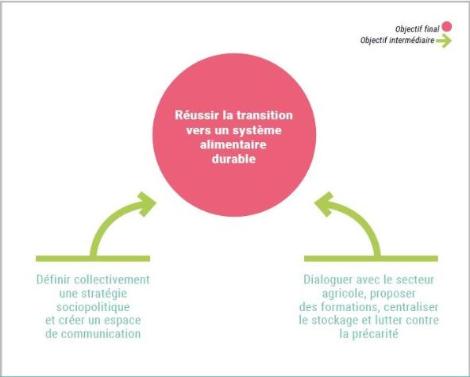Feeding Cordoba
Diagnosis and cooperation towards a balanced and sustainable diet
January 2019
Fondation Daniel et Nina Carasso (FDNC)
Towards a Europe of territorial food systems ?
This study is extracted from the analysis of twenty-two French and Spanish projects related to new food models, all highlighting different challenges.
In Spain, governance is being built, while French food systems are looking for solutions to change scale. But in both countries, accessibility remains the weak link. Insight into the integration of food policy into the municipal agenda in Cordoba through the involvement and collaboration of a diversity of actors from the administration and civil society.
Cordoba, Spain
In Córdoba, in the Andalusian region, the agricultural surface area represents more than 80% of the municipal territory. Three types of landscape coexist. The sierra is a territory devoted to hunting and agriculture: pasture, cereals and beekeeping are the dominant modes of production. It borders the countryside, which is made up of cereal-growing areas. Agriculture is rain-fed, while in the fertile valley, which has a high productive value, the agricultural production methods make use of water resources. The monoculture of olive trees is developing for export, with intensive modes of production. With the « Feed Córdoba » project, the city council is seeking to take full advantage of this agricultural resource to preserve the health of its inhabitants and its environment.

The city of Córdoba benefits from a substantial supply of local agricultural products, allowing seasonal feeding. It also has a wealth of experience in the field of agro-ecological transition and food sovereignty: twenty years of initiatives in agricultural production and distribution, the creation, in 1991, of the Centre for Agricultural Sociological Studies of the University of Cordoba and, in 2010, that of the Alliance for Food Sovereignty. By joining the Milan Pact, the City Council has confirmed its commitment to working for sustainable, local and balanced food for its territory. The main objective of the « Feed Córdoba » project is the collective construction of a sustainable and resilient urban food model. It is based on the consolidation of spaces for exchange and participation, which are essential for the implementation of a sustainable and local food system in the province of Cordoba. The project is being carried out in a partnership framework, with municipal funding through the environment department. It gives impetus to the city council’s food policies and supports the dissemination of the project’s activities and results.
The association VSF-Justicia Alimentaria Global and the Centre for Sociological Agricultural Studies of the University of Cordoba share their experiences in the coordination, monitoring and animation of participatory processes. Other actors are actively involved in the « Feed Córdoba » project: Mercacórdoba S.A., the Eco Córdoba association of shopkeepers and hoteliers, the Ecomercado association and the Alliance for Food Sovereignty of Córdoba.
After defining a strategic framework, four axes are developed: accompanying the agro-ecological transition and the development of short circuits, developing innovation and training in sales networks, optimising logistics, facilitating access for the entire population to local, fresh and sustainable products.
A common framework and a common language to bring together all stakeholders
The signing of the Milan Pact and the mobilisation of citizens represent a turning point for the integration of Spanish food policy into the municipal agenda and the adhesion of a diversity of actors to a common cause. The diagnosis and the participatory process make it possible to share information on existing actions, within the administration and civil society, and to involve a maximum number of actors.